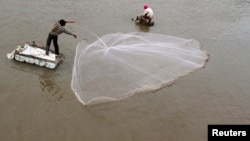Laos is facing increasing pressure to delay construction of a 260 megawatt dam on the Lower Mekong River because of concerns about its environmental and social impacts. A gathering last week in Laos highlights the continuing controversy surrounding the project.
The member states of the Friends of the Lower Mekong came together with the countries of the region last week for the first time since the group was created in 2009 -- marking a new step in diplomatic pressures on the Laos government to delay or halt construction of the Don Sahong Dam.
Environmental impact
The planned $600-million project in the Siphandone (Khone Falls) area of southern Laos is less than two kilometers from the Cambodian border. It would create valuable electricity to fuel growth in the region, but environmentalists and neighboring countries worry it could damage an ecological system crucial for feeding millions of people in Southeast Asia.
The dam would be the second proposed for the Lower Mekong after the $3.8 billion Xayaburi Dam in northern Laos, itself a focus of public debate and controversy over its potential impact on the environment.
The Laos Government agreed to a six month period of regional consultations on the Don Sahong Dam. But these concluded in late January and Lao officials have indicated they are preparing to start construction soon, despite concerns from groups who say the dam should be studied further.
The meeting of the Friends of the Lower Mekong (Australia, New Zealand, the European Union, Japan, the Republic of Korea, the Asian Development Bank, the World Bank, and the United States) in the southern Laos town of Pakse centered on issues of water resources, energy needs and food security.
Carl Thayer, a political scientist at Australia’s University of New South Wales, says the meeting, led by the United States, appeared aimed at sending a message to Laos to reconsider building the Don Sahong Dam.
“I think it’s The Friends of the Mekong and organized diplomatically because the Don Sahong is not as expensive as the Xayaburi Dam - and its impact is potentially enormous. So it’s easier - in one sense - for Laos to give away something small," Thayer explained. "And concentrate on the big money numbers - if it’s going to become a major political issue.”
Thayer said both Cambodia and Vietnam have been lobbying strongly for the dam project to be reconsidered given the potential adverse impact on fisheries and water flow.
Scientists said the dam would block the main river channel, preventing the migration of fish during the dry season, and threatening the highly endangered Irrawaddy dolphin.
Concerns: human rights, economy, culture
Director of the Cambodia-based Khmer Institute of Democracy, Sorya Sim, said international involvement in the decision-making process is needed because of how the dam will affect the river as it flows through other countries.
“Building a dam is not a one country issue. It’s connected to the region and about human rights, the environment, economic and culture. So it’s a good idea to have an international input whether it’s American, or European or Asian - no problem," said Sorya Sim. "As long as you have more input and the political and legal structure there when to go ahead.”
But scientists employed by the dam’s construction company, Malaysia-based Mega First Corp, have dismissed the concerns raised by environmental groups, including Vietnam’s fears that it could worsen the already increasing salinity in the Mekong Delta.
Pianporn Deetes, Thailand campaign coordinator with the U.S.-based environmental group, International Rivers, says it appears that the consultation process overseen by the intergovernmental body, the Mekong River Commission, is broken down, reducing the chance that all affected countries will sign off on the construction.
“Even though the other three governments did not really agree with the project but the host [Laos] government still insists that it has sovereignty rights to develop the project," Pianporn Deetes noted. "And very important is that the trans-boundary impact has been ignored. So who is paying this cost? [It] is the millions of people whose livelihood depends largely on the Mekong River Resources.”
The Friends of the Lower Mekong said fresh initiatives are under way to promote sustainable energy, including alternative sources, and funding for studies on the impacts of hydro-power on the communities and the environment and supporting development of a national power grid for Laos.







